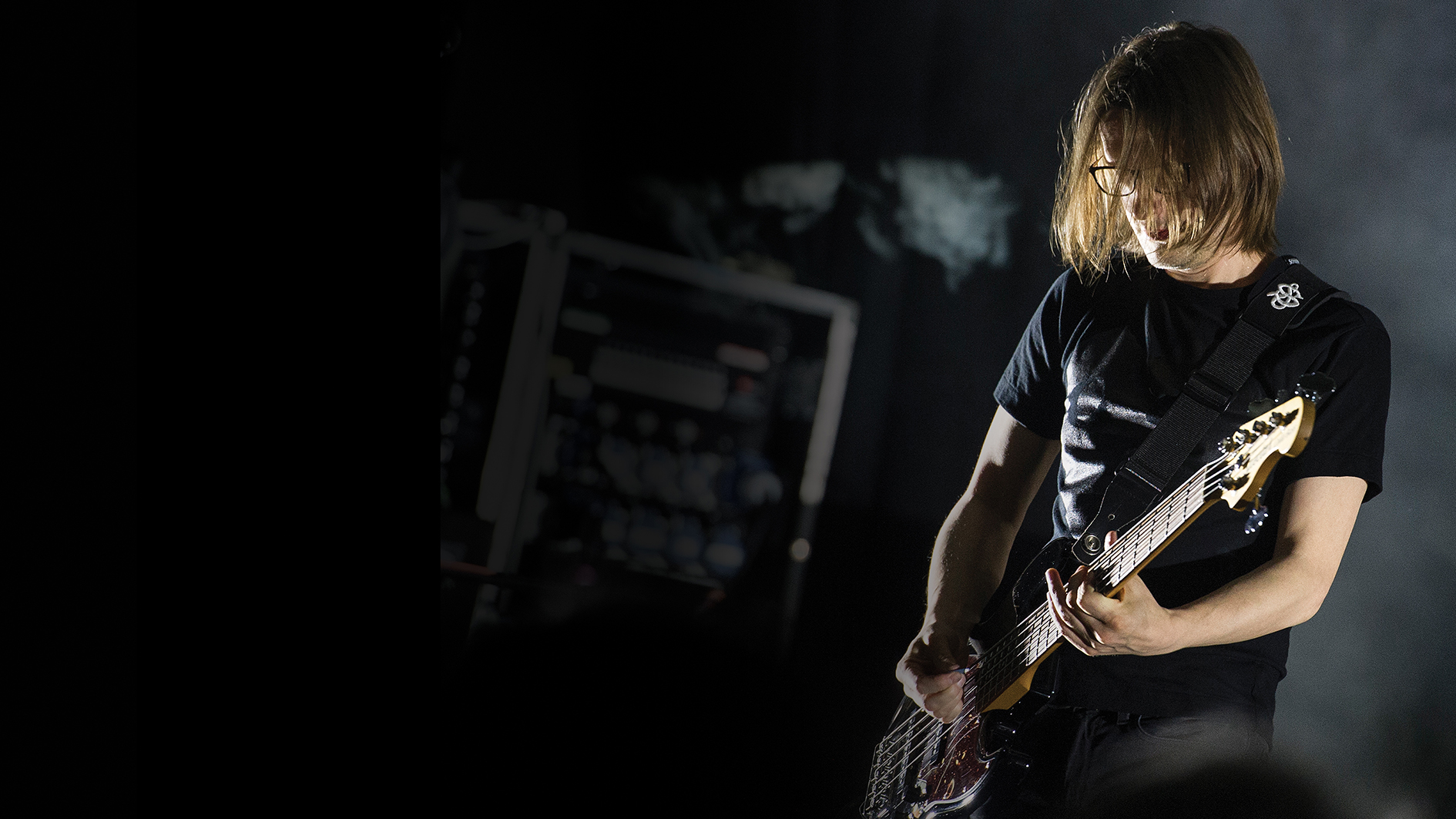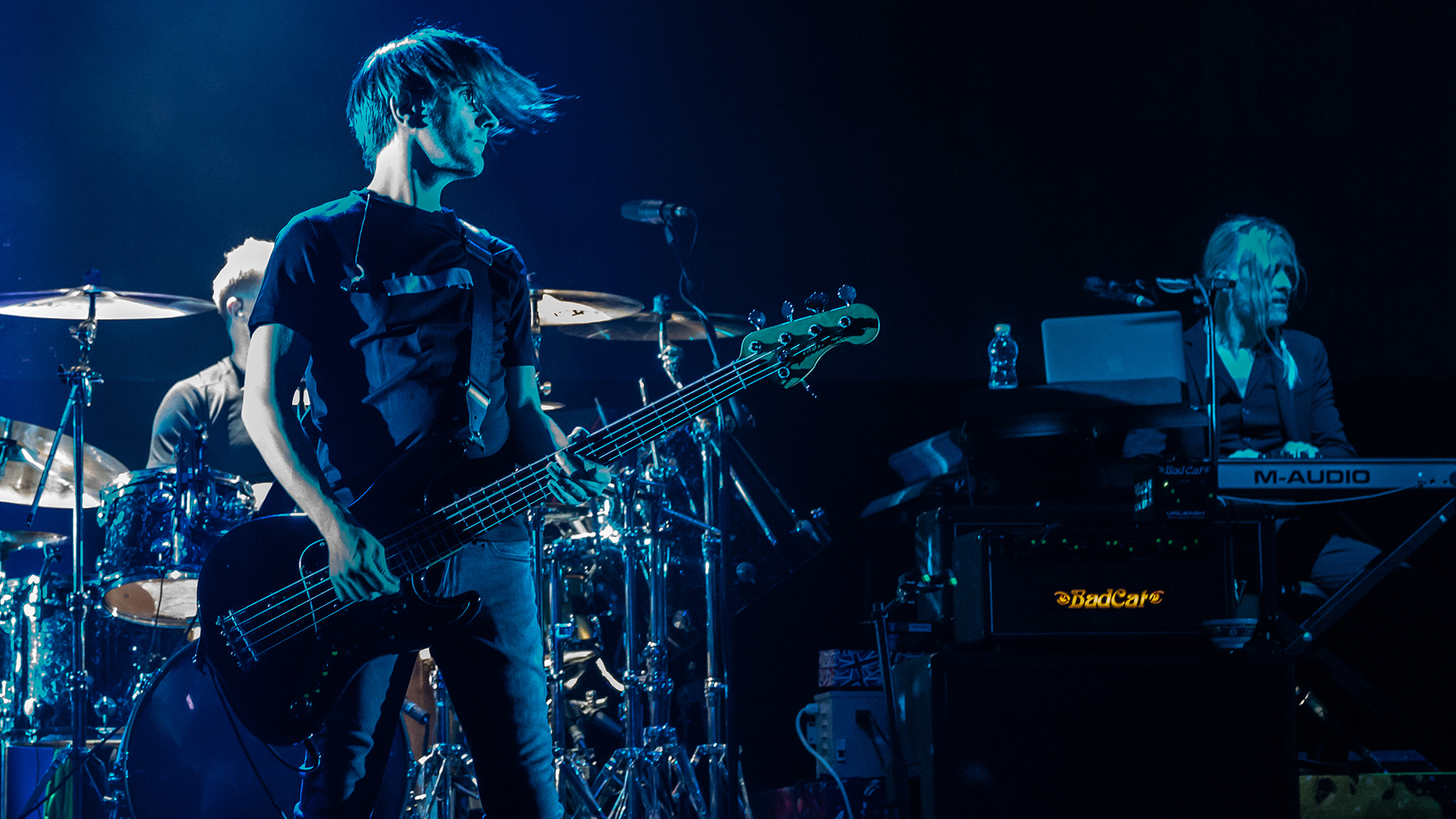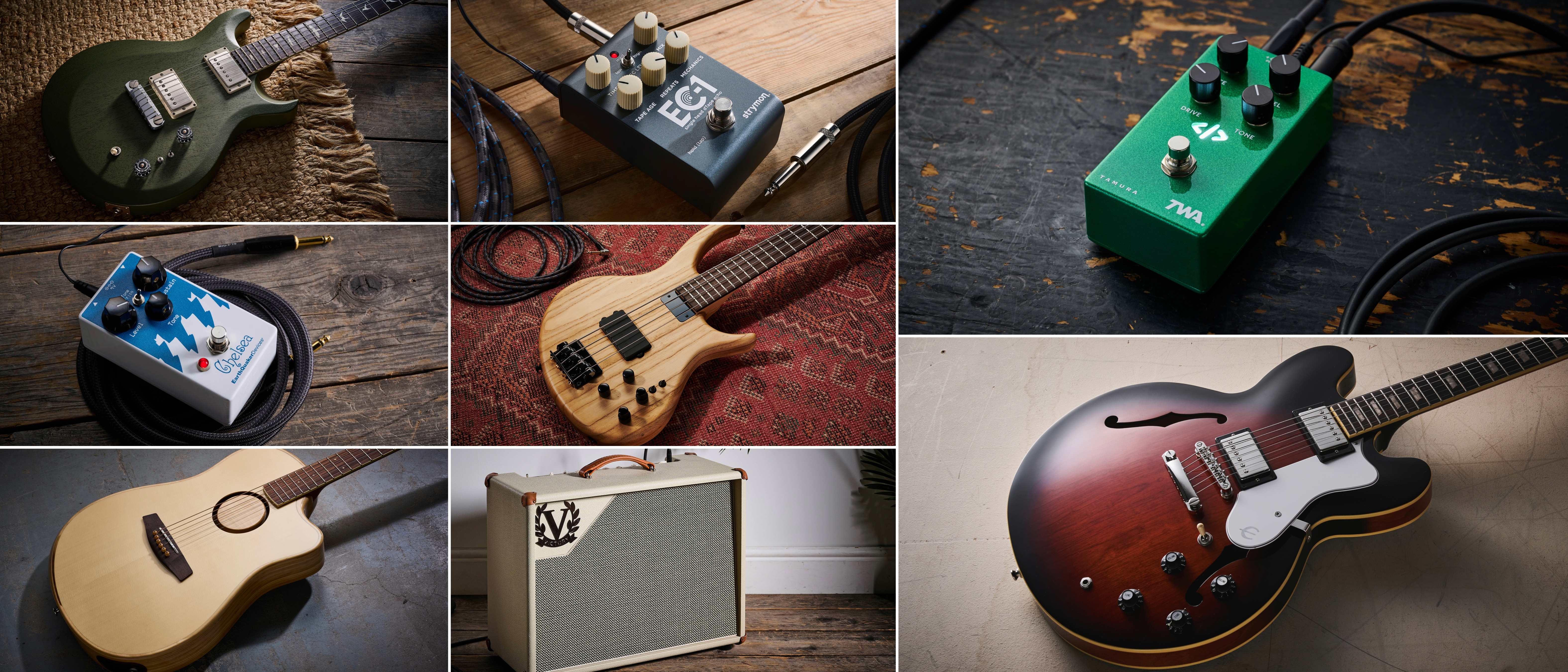Steven Wilson: “I wanted to make an album that was more reflective of the electronic world we live in – the guitar is there, but it’s used in a different way”
The trailblazing prog man talks the future of guitar music, the rise of electronica and how Elton John came to appear on his latest album, The Future Bites

Steven Wilson fans may have noticed a very familiar voice narrating a shopping list halfway into Personal Shopper, the lead single from the English singer-songwriter/super producer’s sixth solo album The Future Bites.
The luxury items – consisting of first-world conveniences such as teeth whitener, volcanic ash soap, fake eyelashes and branded water – serve as a stark reminder of the things we love but don’t really need, a scathing critique playfully disguised as a love-letter to modern-day consumerism.
To voice this ensemble of premium products, there was only one person who fit the bill... and his name was Elton John.
“It was pretty mindblowing,” says Wilson, talking to GW from home as his dog Bowie bounces on the sofa next to him. “To give you some background on that, I had this song and there was this middle part. One of the things I’ve done many times over the years is have this shape for longer songs, it’s actually something I adhere to a lot – you’ll hear it in [Porcupine Tree's] Arriving Somewhere But Not Here or Time Flies...
“I’ll create this song and at a certain point it breaks down into an ambient slow section which then builds back into the song again. In this case, I wanted a famous voice, one people would recognize, reading a list of what I call first-world consumer items. Things like designer trainers, deluxe edition boxsets, fitness club memberships, stuff we all love to consume. But I didn’t really know who I wanted...”
The lightbulb moment came while watching 2019 Elton John biopic Rocketman, which ends with a pre-credit sequence explaining how Elton had managed to kick all of his addictions except one, followed by a picture of him on one of his well-documented shopping sprees. It was too perfect, and by Wilson’s own admission, failure was not an option...
“I was originally thinking maybe an actor or an actress, someone recognizable from that world,” he explains.
All the latest guitar news, interviews, lessons, reviews, deals and more, direct to your inbox!
“Then I went to see Rocketman and ping! It had to happen. To cut a long story short, I managed to get him the song through his ex-manager Merck Mercuriadis, who is a good friend of mine. The next day I got a message saying Elton is ringing you in 10 minutes. I shat myself, not literally you’ll be happy to hear...”
That must have been quite an experience. What was he like to speak to?
“My phone said it was number calling from Antibes in the south of France. I knew it had to be him! So I sheepishly answered the phone and before I could say anything he was like, ‘Steven, this is Elton John, I just want to say I fucking love your song, let’s do it!’ And it came out so good, because he totally got it...
“Even though it was setting himself up in a way, as the most famous living shopper on earth, who consumes like no one else, he loved it! The song is supposed to be fun… what I call black comedy.
“I love shopping myself, look at all the records behind me! So 50% of it was a love-letter to consumerism and the other half was discussing the more insidious side of it, ecommerce in particular.”
We’ve never been more closely monitored, in that sense...
“The fact is there are all these algorithms out there that analyze our Internet footprint, using that data against us to make us buy things we don’t need. To make us watch things we don’t want to see. To make us listen to things we don’t want to listen to and even to believe things that we don’t want to believe.
“There’s a lot of that stuff in the modern world which fed into the lyrical preoccupation on The Future Bites… what you might call the Trump era. The age of fake news, the years where telling the truth didn’t seem to matter anymore.
I sheepishly answered the phone and before I could say anything he was like, ‘Steven, this is Elton John, I just want to say I fucking love your song, let’s do it!’
“What mattered was using the Internet as a form of power, which feeds into songs like Personal Shopper, Self and Follower – which is very much about the idea of an influencer… such a bullshit thing but it’s true these people are very powerful these days.”
The album was co-produced by David Kosten, who you’ve never worked with before...
“I’ve known David for a very long time, about 25 years or more even, because we started out in the business around the same time. And back then we were both doing music for TV commercials to try and keep ourselves going financially speaking, as well as trying to gain a foothold in the same industry.
“Quite often we’d be going up against each other for the same jobs, he’d be after a Lego commercial and I’d be going for it too. And then I might try to land an M&M's thing and he’d be trying the same too.
“So we got to know each other around then and ever since I’ve followed his career as a producer with a lot of fascination and admiration. He’s worked with Bat For Lashes, The Flaming Lips and his own project Faultline.
“I really admired his craft from afar, obviously he went more into a pure production role and I went more into writing and performing. But what I loved about David is that we both grew up around the same time...”

It certainly sounds like a good way of furthering your own evolution as an artist...
“Exactly. We’re '80s boys and a lot of our musical reference points are from then. I hear them in his music but his production style never sounds nostalgic to me. And if I had a criticism of myself – well, I have lots of them – but one of them would be that sometimes I very easily homage the past and disappear down the nostalgia route in a way.
“It’s something I never got from his production. It always seemed very fresh and contemporary, while also musically knowledgeable. If you listen to his work with Bat For Lashes or the album he did for Keane in 2019, it’s all very current with a lot of musical literacy there too.
“For this album, I wanted to make something that very much felt of the now but without sacrificing my own personality or crassly trying to be ‘down with the kids’ or anything like that. I wanted it to still sound like one of my records but with more of a contemporary musical palette.”
Which probably explains why this is the most electronic-led album of your career to date?
“Yes, and it would be fair to say that we all now live in the electronic world. We’re constantly surrounded by electronic sounds, whether it’s from your laptop, phone or doorbell. The entire world is populated and soundtracked by electronic noises.
I don’t play the guitar the way most players do. I play it more like a producer or sound designer
“My kids don’t even know what a guitar sounds like, they just don’t hear guitars! I wanted to make an album that was more reflective of that world we live in, without completely forsaking it. The guitar is there, but it’s used in a different way. Some of the classic rock affectations are perhaps not there this time.”
Speaking of which – what did you use for the acoustic sounds on Unself, 12 Things I Forgot and Personal Shopper?
“It was a Takamine on those tracks. Interestingly the guitar solo on Follower, which is a very angular kind of thing, was also played on that acoustic… but you’d never know it in a million years! It went into my pedalboard and through my little Hughes & Kettner practice amp which has a Red Box in the back to take it into the computer.
“I like finding different ways to record. On this record, I didn’t want any of those classic rock solos. That’s actually one of the reasons I played all the solos myself. I don’t play the guitar the way most players do. I play it more like a producer or sound designer.
“There’s some Electro-Harmonix Small Stone phaser on that track too. The funny thing about that pedal is you need the right vintage...
“I was told that by someone who knows about these things, Daniel Steinhardt from The GigRig and That Pedal Show. He mentioned that in 1975 they changed the main component in that pedal because they could no longer get the same capacitors and resistors, and the sound of the pedal completely changed as a result.
“So I managed to find a pre-1975 version and it’s a wonderful sound. It’s that classic phase tone you hear on so many of the records from the early '70s.”

We’ve seen some boutique pedals from Analog Man, Strymon, Origin and Diamond on your board over the years...
“Yeah – that Follower solo would have gone through my Prince Of Tone overdrive pedal, as well as my Strymon Timeline for delay. I’m a big fan of putting the delay and reverb in front of the gain stage on amps.
“I’m not a big fan of that clean and polite way of putting the delay after the gain or in the loop. I love the sound of twisted metal, by which I mean the sound of distortion, reverb and delay fighting for supremacy in the gain stage of an amp.
“You get that Neil Young kind of messy grunginess to it. I like it sounding out of control. As a player, you almost have to fight to harness it. You hear that sound on old Mahavishnu Orchestra albums… trying to tame the beast and control all that information.
“Another solo, on the song Personal Shopper, was put through an old analog VCS3 synthesizer – which is an old Brian Eno technique from those early Roxy Music albums, actually – and processed that way. So it was more about using the guitar in a more textural aesthetic than a typically muso one.”
What is it that you liked about the VCS3 in particular?
“I like the unpredictable things that happen when you work like that. The VCS3 is a very old and unstable piece of technology, very primitive in its own way. It does things to sound and never in the same way twice, and I like that element of accident or serendipity.
It seems like the musical vocabulary of the pentatonic guitar solo is almost exhausted. I know I’m talking to a guitar magazine here but I’m going to say it anyway - I feel that way about the guitar in general
“Back on those old albums, Brian Eno was processing not only the synth sounds themselves but also a lot of the other instruments like saxophones, guitars and drums through the VCS3. I like the idea of a solo being fed through the machine – again to make it sound slightly out of control, like machines running amok!”
Your leads are less pentatonic and blues-based compared to most other rock players...
“I think so, I like the unpredictable ideas and wrong notes! I’m probably more Robert Fripp than David Gilmour, in that respect. Although ironically, David was my hero guitar-wise when I was growing up.
“On those early Porcupine Tree songs, a lot of those solos are very pentatonic, blues-derived and Glimour-esque. But now I find I’m more interested in angularity and modality… the wrong notes rather than the typical right ones.
“I just find it more interesting. It seems like the musical vocabulary of the pentatonic guitar solo is almost exhausted. I know I’m talking to a guitar magazine here but I’m going to say it anyway - I feel that way about the guitar in general.
“With my limited skills, it’s very hard for me to pick up the guitar and play anything that excites me…. because like I said I’m very limited as a player and I feel like it’s all been done, you know? Done by me or done by someone else.
“Whereas when I walk over to the synths or electronic stuff, I feel like there are a lot of things that still feel fresh to me. That’s one of the reasons why I’ve kinda moved progressively more towards playing notes that are not necessarily the predictable notes and sounds that are not necessarily the predictable sounds.”

Self has some clean funk lines that aren’t a million miles away from what you’d expect to hear from a Nile Rodgers record...
“It’s definitely got a funk feel. I guess it’s what you might call avant-funk. Also on that song, there are those big slabs of distorted noises. I’m using the guitar almost more like a painter than a player, throwing on these big daubs of sound.”
12 Things I Forgot has an almost Beatlesy feel to it, there are lot of linked chords with only one note changing between them...
“Yeah, I guess it is a bit Beatlesy! There’s also a bit of Elton John in there. It’s classical songwriting in that sense, typical of songs by people who were limited in the nicest possible way – and I include myself in that. People who weren’t completely trained and technical players.
“I like to find those simple chordal shapes and move my fingers in the smallest possible increments to create melodic shifts. Sometimes just going from a major to a minor can be a really fascinating way to create. Being someone who is not that interested in the theory stuff, I don’t even know the names of the chords I’m playing most of the time...
“Or at least I’m not thinking about the names of the chords! I’m just approaching guitar in a more intuitive way. 12 Things I Forgot I actually wrote on piano. It worked really nicely to add that Beatlesy strum, or I think of it more as the My Sweet Lord sound. That lush and golden bed of acoustic guitars.”
There’s also a major7 arpeggio thrown in there at points...
“It’s an Fmaj7 arpeggio... I love major sevens! One of my friends, Steve Rothery from Marillion, hates major seventh chords. To Rothers, they sound like instant cheese. But I love them.
“There’s probably not one single song I’ve written in the last 10 years that hasn’t got a major seven in there somewhere… though I’m probably exaggerating.
“There’s some about those chords that instantly sounds nostalgic and fuzzy to me. I think of Burt Bacharach, songs like Do You Know The Way To San Jose or Raindrops Keep Fallin’ On My Head which have that wonderfully wistful nostalgia and sense of regret. And 12 Things I Forgot is a song about regret and nostalgia, so the major seven was such a big part of that musical palette.”
There’s probably not one single song I’ve written in the last 10 years that hasn’t got a major seven in there somewhere…
Eminent Sleaze has some pretty monstrous bass tones from the off and some ear-twisting Telecaster stabs towards the end...
“Yes, that was a funny one. I think one of the reasons it came out the way it did is because I had the title first. It was the idea of sleaze… how does that manifest in musical terms? So I kind of arrived that this slow, sleazy funky lope with slapback on the bass – which is me playing – and same on the percussion, guitars, voice and beyond.
“Everything had this '50s rock and roll slapback coming from David’s old Space Echo tape delay, which has a wonderful character to it. The funny thing about that song is that a lot of people have said I’ve gone very electronic on this album, mentioning that track… but it doesn’t have any electronic instruments on it at all.
“There’s percussion, bass, guitar, Fender Rhodes, strings and vocals. But I kinda understand what they mean because it has an electronic sensibility to it – part of which is down to the funky groove and that use of slap on everything.
“Even the guitar solo isn’t a conventional guitar solo, it’s slabs of dissonant noise, using weird chord shapes that feel random and following my fingers in that sense. I wanted something that sounded very agitated and felt a bit sick and a bit sleazy too.
“That’s a great example of a song that was born out of the subject matter. If you’ve got a title like Eminent Sleaze, how do you make the music reflect that? You want to create that sense of unease with almost a sense of sexual violence to it. That’s all there in the way it’s played.
“And because it’s me playing most of the instruments on this album, I would say there’s a much more direct correlation between the subject matter and the way the instruments are played.”
King Ghost is another track led by sub synths and arpeggiators, with no discernable guitars whatsoever...
“You’re right, that’s a purely electronic track with no guitars on there at all. It’s all analogue synths really, the arpeggiators are a combination of the Prophet-5 and ARP 2600 and the bass sound is a Sequential Circuits Pro One. They are all vintage keyboards from the '70s… which is what I love about this record, it’s very electronic.
“One thing a lot of rock fans tend to believe about electronic music is that it’s very cold and not emotional. And actually, nothing could be further from the truth. I think some of the most beautiful electronic music is just as emotional, textured, enveloping and engaging as anything else!
“I’d say King Ghost is one of the most beautiful and emotional things I’ve ever written, and using only electronic sounds. Even the vocals are heavily processed on that one, and yet it still has that emotional kick.
“Which is kinda where I was trying to go on this record… asking how we could transport my musical world into a different musical palette and vocabulary, but without losing the qualities people recognize from my other albums.
“That’s why I’m so proud of it - because it feels like the next logical step for me but is also quite radical in how I’ve changed things, with a lot of analogue synthesizers where perhaps guitars would have been before.”
I’d say King Ghost is one of the most beautiful and emotional things I’ve ever written, and using only electronic sounds
Sadly, like every other artist in the world, you’ve had to reschedule your performances in support of the new music. What can we expect when it’s safe for you to return to the world’s stages?
“We couldn’t get the O2 Arena in London again sadly, it’s booked up to 2023 or something crazy. So I’m going to Hammersmith Apollo with potentially a second night. It’s a shame… I was looking forward to presenting a show in an arena context. I did have, and still do have, big plans for the production.
“It’s an album that has a lot of themes which will lend themselves well to having some fun in a live context. If you think about the themes of consumerism, identity… even the album cover!
“I love it because people think it’s me but it’s not, it’s a model. It plays with this idea of identity and whether you can believe what you see in this whole era of fake news. People saw the cover and thought ‘It’s Steven Wilson!’ and it’s not – it’s a female model called Daisy, made up to look like me and digitally manipulated to look even more like me.
“If you imagine all of those ideas applied to a live show, I’m going to have a lot of fun with it.”
- The Future Bites is out on January 29 via Arts & Crafts.
Amit has been writing for titles like Total Guitar, MusicRadar and Guitar World for over a decade and counts Richie Kotzen, Guthrie Govan and Jeff Beck among his primary influences as a guitar player. He's worked for magazines like Kerrang!, Metal Hammer, Classic Rock, Prog, Record Collector, Planet Rock, Rhythm and Bass Player, as well as newspapers like Metro and The Independent, interviewing everyone from Ozzy Osbourne and Lemmy to Slash and Jimmy Page, and once even traded solos with a member of Slayer on a track released internationally. As a session guitarist, he's played alongside members of Judas Priest and Uriah Heep in London ensemble Metalworks, as well as handled lead guitars for legends like Glen Matlock (Sex Pistols, The Faces) and Stu Hamm (Steve Vai, Joe Satriani, G3).

